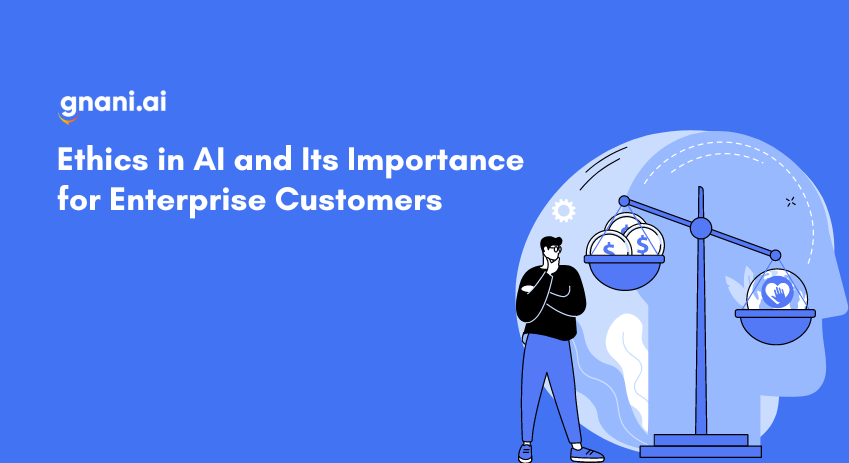An analysis of how ethics feature in the enterprise uses of artificial intelligence.
Understanding Ethics
If you look up the meaning of ethics in a dictionary, you will find something along the lines of the branch of knowledge that deals with moral principles. Does this seem like something that would play any role in the use of artificial intelligence? Most people would say no, but anyone who has used AI, even if it is just to test it out, would agree that ethics plays a crucial role in AI. Read on to find out why.
Ethics in AI: Why We Need It?
- A 2020 study revealed that voice recognition systems from Amazon, Apple, Google, IBM and Microsoft showed more errors when transcribing black people’s voice than they showed while transcribing white people’s voices.
- Amazon had to scrap their AI recruiting tool because it was unfairly biased towards men over women applicants.
- In 2016, Microsoft’s chatbot, Tay, shared racist, transphobic, and antisemitic tweets within 24 hours of being launched to the public.
These are just some examples of instances where human biases have crept into AI. In fact, AI can be used to make more impartial decisions but that hasn’t been possible in most cases so far. This is because the training data and algorithms used to train AI reflect the biases that humans carry. So, the onus is on AI researchers to ensure that they use the most inclusive data and unbiased algorithms available to train their AI tools. Biases rooted deep in human society will creep into almost any data set, but AI researchers must maximise their efforts to make sure that this doesn’t happen.
Since laws surrounding the ethics of AI research are yet to be determined, AI researchers have fallen back on the Belmont Report to guide them.
AI biases can be addressed through a more inclusive data but the people using AI tools may have other concerns such as those listed below:
- Will AI misuse the data I share?
- Will AI have the best suggestion for me?
- Will becoming dependent on AI be detrimental to me?
Solving these issues will take more effort than just ensuring that the training data is unbiased. Continuous research, more widespread use and defining AI ethics properly are the only way to convert those who are sceptical of artificial intelligence.
In the time it takes to have clearly defined AI ethics, it is necessary for those working with AI to be mindful of human biases creeping into the datasets they use to train their AI models.
How Gnani.ai Mindfully Uses AI
Gnani.ai is a conversational AI company. It was the first one in the conversational AI market to make a unified customer experience platform available to its enterprise customers. Most modules in this unified platform use generative AI and the team at Gnani.ai does their best to ensure that human biases do not creep into it.
Mindful Use of AI in Automation
Here are a few steps Gnani.ai takes to make sure that AI is used mindfully in the services they provide.
Transparency Is a Must
Gnani.ai believes in transparency. So, all Gnani.ai’s enterprise customers are made aware whenever generative AI is employed in any module of their CX design. For instance, the automation services are generative AI-enabled, so customers are notified about this whenever they automate their CX using Gnani.ai.
Clear Stance on Who Owns Customer Data Is Established
To design virtual assistants, Gnani.ai might need some specific information from their enterprise customers. This data is used to train LLMs, or this data is provided to LLMs to scrape and provide answers to customer queries. In such cases, Gnani.ai is mindful to ensure that they do not misrepresent the data in any form. The rules regarding the ownership of this data is also clearly defined for the customers. This assures them that their data will not be misused or misrepresented in any way.
AI Is Better When Used in Collaboration With Humans
Gnani.ai believes that artificial intelligence is best used in collaboration with humans and the team at Gnani.ai is committed to this. Gnani.ai’s products and services are designed centralizing this idea. Here is how it is done.
- The excessive workload on human customer service agents is reduced by using Gnani.ai’s generative AI-enabled automation product, Automate365.
- Performance of human customer service agents is optimized by using Gnani.ai’s generative AI-powered product, Assist365.
- Post-call work for human agents is reduced and analytics is refined by using Gnani.ai’s generative AI-enabled analytics product, Aura365.
While delivering AI-powered customer service solutions to their 60+ enterprise customers, Gnani.ai ensures the ethical employment of AI in all their products.
Check out Gnani.ai’s products for yourself. Click here.


